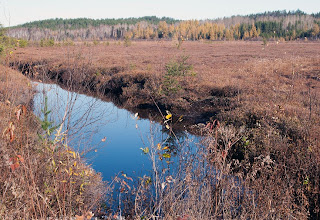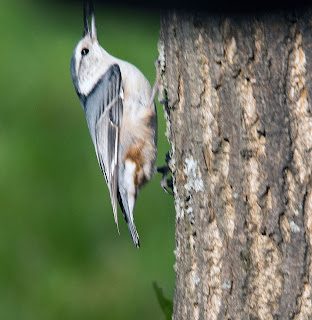 |
| East Track Bog. |
Something a bit different today. We got out during the two day good weather interlude that we had, and actually got into the East Track Bog. To avoid confusion, probably for me, since I haven't taken any geography since the ice age, we live in the Canadian shield, and the Vermilon forest is a Great Lakes-St. Lawrence forest,simply put a mixed forest but leans to softwoods. The Carolinian forest lays to the south, a bit along the north edge of Lake Ontario, with most in the US. It is mostly gone, except for small pieces preserved in parks.To my north lays the Boreal Forest, a forest distinguished by tundra or muskeg. The Dark-eyed Juncos are Boreal Forest dwellers and migrate through here. I suppose officially here we have wetlands or bogs. I define the difference in this blog as a wetland being covered in water all or most of the time, while a bog merely some of the time. Bogs in the UK are acidic and form peat. The only one in Ontario that I am aware of is the Byron Bog near London, Ontario that fulfills that definition.The East Track Bog may not be a true bog, or true muskeg, I don't know. But it's as close as most of you are going to see. In photo two, you can see the black earth which is the soil formed here. This soil is harvested and sold to the mining companies to start the regrowth process and cover the damage that mining does, i.e, the slag heaps for instance. The soil needs endless time to reform in the bog and this is just an other curse of mining. An aside: the Alberta Tar Sands are in muskeg, but the look is the same, and you can see the contamination possibilities,and understand the fragile environment. It doesn't duplicate, although the oil companies and the governments would have us believe that. The efforts to redo the muskeg are failures in every way, and water contamination is enormous. This is all to the shame of Canadians who facilitate it, the Norwegians, and the Dutch who claim to be green and maybe are in their own countries. And to the Americans south of us who have an insatiable thirst for oil even to the destruction of their own country.
Boom And I are in here because the bog is dry, otherwise we'd sink, and there are no insects now which would eat us alive in the spring or summer. Not all the photos were taken on this hike. A Post to WBW @
http://pineriverreview.blogspot.com/ Click on photo for slide show.
 |
| Shows the black earth. |
 |
| Dark-eyed Junco, a member of the sparrow family. |
 |
| Dark-eyed Junco |
 |
| Dark-eyed Junco |
 |
| Junco in Slate Gray, same species. |
 |
| Slate Gray Junco |
 |
| White Breasted Nut Hatch. |
 |
| White Breasted Nut Hatch. |
 |
| White Breasted Nut Hatch. |
 |
| Downy Male Woodpecker. |
 |
| Downy Male Woodpecker. |
 |
| Male Hairy Woodpecker. |
 |
| Immature White Crown |
 |
| Mature White Crown |
 |
| Tree Sparrow |
 |
| Blue Jay With Raised Comb. |
 |
| Blue Jay. |
 |
| Black-capped Chickadee. |
 |
| Black-capped Chickadee. |
 |
| Black-capped Chickadee |
With the migration of warblers etc. underway or finished, I start to look for different birds and these are some of them. It is not the first time that I've see or photographed a nut hatch, but to me it's a winter bird as are the others. The Juncos come in both a dark and slate gray as above. There is no difference.






















Lovely birds Gary.
ReplyDeleteWhat a wonderful series!
ReplyDeleteI love the colour of the Blue Jay - just gorgeous!!
Great post!!!
ReplyDeletei love the juncos. can't wait for them to winter here again.
ReplyDeleteI really enjoy your bird photos Gary. We don't get as much variety down here.
ReplyDeleteNice! Love the birdie photos!
ReplyDeleteBeautiful images Gary... another interesting post.
ReplyDeleteThere is destruction of nature everywhere, isn't there. It's such a travesty. Hey, I didn't know that a junco is a member of the sparrow family! Where have I been? Love your photos.
ReplyDeleteTime marches on and soon Boom will be happy to see the snow fly. Until then, it is good to see you explore these precious terrains in that brief window between seasons when there is some relief from the insects. It's a privilege to see them through your lens.
ReplyDeleteI share your anger with our short sightedness in ravaging our planet for our addiction to oil. I remember your great posts on the exploitation of oil sands in Canada and its ramifications. What a horror story that was.
Great stuff Gary, cheers!
Great photos. You live in a beautiful place. Mining has messed up a good part of Australia as well and the most recent is the Coal Seam Gas Extraction which threatens to impact on the waters of the Great Artesian Basin.
ReplyDeleteThe chickadees are still having a grand ol' time over at my place; still not posing for pictures though! I've also noticed gray jays over the weekend too.
ReplyDeleteLovely photos, Gary -- and glad that you were able to wander the bog during the nice weather!
ReplyDeleteGreat post Gary. Excellent collection of birds. Particularly like the Junco.
ReplyDeletea great set of birds. :)
ReplyDeleteWonderful photos Gary! I'll know winter has arrived when I see the first Junco here.
ReplyDeleteHi Gary
ReplyDeleteThis was a really great post there was lots of interesting information. Your shots of the junco were reallly good.
Regards
Guy
Love the juncos especially!
ReplyDeleteYou live in an interesting area.
ReplyDeleteGreat photos and in info Gary!
great series, love those fluffy chickadees!
ReplyDeleteLovely winter birds! There are juncos here (still in Oregon); I need to find out if they are the same. Here wetlands don't always have water -- but no building can be done on them. Both to preserve them for wildlife and because buildings would sink during the wet season.
ReplyDeletefabulous pics of a range of birds; I imagine you're out really early to capture many of them?
ReplyDeletewhat a fabulous varity of birds, i see all of these in my yard here in new jersey. i have seen the different blue jays but never thought much about it. i love the junco's, i will start seeing them here soon!!
ReplyDeleteand great catch on those nut hatch's, those little guys are quick!!
Same birds are showing up at the feeders here too. Lovely photos.
ReplyDeleteSoon, I'm afraid our planet will be one gigantic slag heap. We are a greedy and selfish species, and, while we may deserve what we get, those that share the planet with us certainly don't. We have been talking about renewable energy ever since I can remember, but we won't seriously try to develop it until every ounce of oil and gas has been wrung out of the earth.
ReplyDeleteOn the other hand, your pictures are, as usual, very beautiful, and bring joy and comfort to those of us who seem to be perpetually angry these days.
You got a lovely wlak with ncie light and got some nice nirdies pictures ;-) I guess you enjoyed that our. Well done Gary!
ReplyDeleteYour photos are beautiful! The juncos are back in Iowa so I know snow will soon follow.
ReplyDeleteI posted a link to your blog on my Facebook page, your blog is excellent!
ReplyDeleteYour blog is like a virtual trip to places from books by Jack London and James Fenimore Cooper :) The same feeling of North and untamed nature.
ReplyDelete